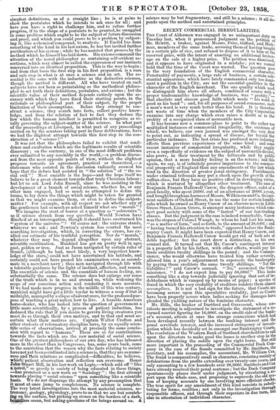RECENT COMMERCIAL IRREGULARITIES.
THE Court of Aldermen was engaged in no unimportant duty on Tuesday last, when it pronounced judgment on the petition of Mr. Hewitt, a broker, against Messrs. Price, Gifford, and Hick- man, members of the same trade, accusing them of having bought in a certain pile of rice, and refused to dispose of it to him at the reserved price, with the intent of exacting an additional broker- age on the sale at a higher price. The petition was dismissed, and it appears to have originated in a mistake ; yet we cannot hold that the time of the Court was wasted. The question goes to the very foundation of the English commercial character. Punctuality of payments, a large rate of business, a certain sub- stantial appearance, which have lately commanded only too domi- nant a position in the City, are not the essential qualities in the
".— that absolute and sincere good faith which made to distinguish him above all others, combined of course with proper tradesmanlike knowledge of business, was " probity, character of the English merchant. The one quality which used d.
" his word as good as his bond " ; and, for all purposes of sound commerce, such a man's word is very much better than his bond. It is therefore not waste of time when the members of the City Corporation examine into any charge which even raises a doubt as to the probity of a recognized class of mercantile men.
It has become now a common-place to point to the rather too multiplied instances of commercial irregularity, the existence of which, we believe, our own journal was amongst the very first to point out, as indicating a spread of disease, far beyond the particular instances. The last crisis has produced more enduring effects than previous experiences of the same kind ; and some recent instances of commercial irregularity, while they supply even a superfluity of evidence on the subject of mercantile disease, also prove, in their treatment by the tribunals and by public opinion, that a more healthy feeling. is on the return ; and this again, we say, is of infinitely greater importance to the commer- cial prosperity of England than any amendments of the law which tend in the direction of greater penal stringency. Punishments under criminal tribunals may put a check upon the growth of the ruffian class, but they have no positive effect in developing virtue, which is nurtured by altogether other treatment. The ease of Benjamin Francis Hallowell Carew, the dragoon officer, cadet of a good family, who spent 26001. out of an allowance of 20001. a year, and bought brougham harness of Messrs. Wilkinson and Co. theemi- nent saddlers of Oxford Street, to use the same for certain humble cabs which he owned as Henry Carew of an obscure mews in Little Grove Street, Lisson GrOve, is amongst many instances which con- nect good society .with some of the " fastest ' of our fast-trading classes. But the judgment in the case is indeed remarkable. Carew was the stepson of Colonel Waugh, to whom he had lent his name, " as a matter of form," and so forth, to the amount of 58,640/. ; and " having turned his ettention to trade," appeared before the Bank- ruptcy Court. It might have been expected that Henry Carew, and Benjamin Francis Hallowell Carew would get rid of both sets of
debts to ; but the court drew a distinction, as his own counsel did. It turned out that Mr. Carew's contingent interest in a property left by his father, with other effects, would pay his trade creditors twenty shillings in the pound ; and the Commis- sioner, who would otherwise have treated him rather severely, allowed him a year's adjournment to supersede the bankruptcy by paying those creditors the same twenty shillings. "Not the liabilities ? " said Carew's counsel. " No," answered the Com- missioner, " I do not expect him to pay 58,000/." This looks something like a step towards judicially ignoring that sort of in- debtedness which is vamped up by means of paper; a species of fraud in which the easy credulity of creditors renders them almost accomplices. It is not a bad sign for the future, that Courts are becoming severe upon this speculative credulity, just as Courts have been properly severe when ladies seeking for damages have pleaded the yielding nature of the feminine character. Mr. Hills, the banker of Dartford and Gravesend, whose cer-
tificate meeting is adjourned to investigate the statement of a re- turned convict figuring for 16,000/. on the credit side of the bank- er's account, attests at once the strange connexions which had been developed recently between the banking interest and the penal servitude interest, and the increased stringency of investi- gation which has decidedly set in amongst our Bankruptcy Courts. The resolution of the Western Bank of Scotland shareholders to call upon the directors to make good the losses is another step in the direction of placing the saddle upon the right horse. But still more important is the proceeding of the Commercial Dock Com- pany in the case of the frauds committed by Mr. Smithers, the secretary, and his accomplice, the accountant, Mr. William Cox. The fraud is comparatively small in character, consisting mainly ol defalcations from the profits extending over twenty-one years, and only amounting to a few hundreds over 26,0001. Smithers and Cox have already received their penal sentence ; but the Dock Compaq spontaneously places itself under judgment, by circulating a re- port upon the whole case, and proposing to supersede the old s' tem of keeping accounts by one involving more efficient ohecks The true spirit for any amendment of this kind consists in substi- tuting for forms, realities; not only in the investigation throx#1, responsible officers, and through their superiors in due turn, bat also in attestation of individual. character.


























 Previous page
Previous page